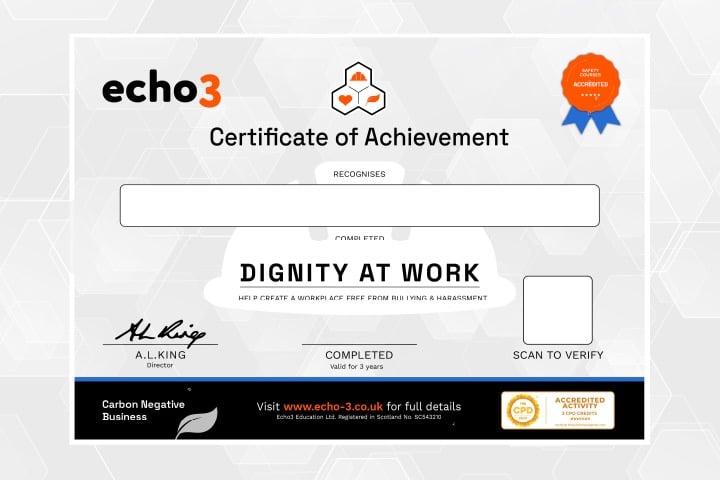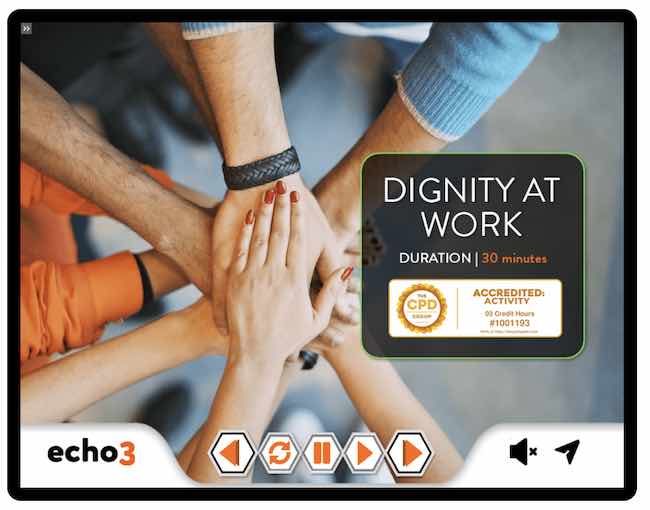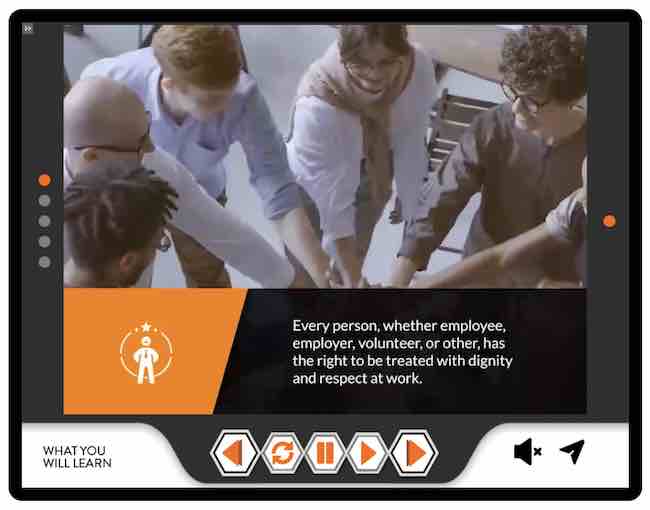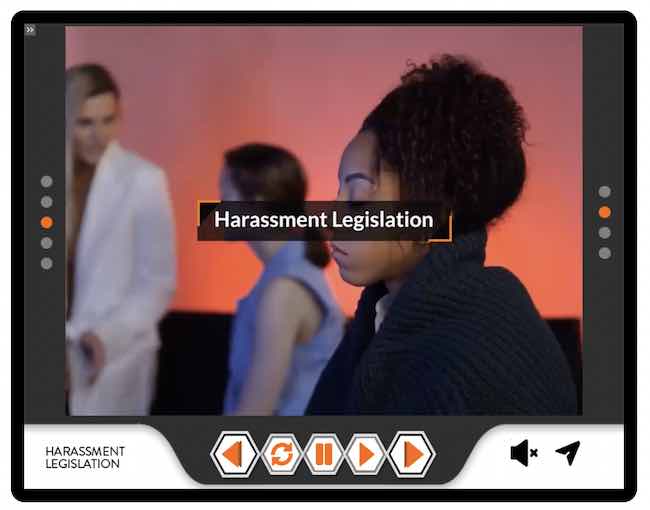Your basket is currently empty!

Dignity at Work Course
Online Dignity at Work course designed for all staff. The training provides the knowledge needed to reduce bullying and harassment at work. Certificate is emailed on completion.
- For Me
- For Teams
DIGNITY AT WORK
 Online Dignity at Work course designed for all staff. The training provides the knowledge needed to keep your workplace free from bullying and harassment.
Online Dignity at Work course designed for all staff. The training provides the knowledge needed to keep your workplace free from bullying and harassment.
Everyone at work has a right to be treated with dignity and respect. Upholding this right at all levels in your organisation is an employers duty under the Equality Act 2010.
Failing to promote a positive working environment can negatively impact moral, the quality of work and potentially result in legal action.
COURSE OBJECTIVES
 Everyone is entitled to a workplace free from bullying and harassment. This is a legal right of the Equalities Act 2010.
Everyone is entitled to a workplace free from bullying and harassment. This is a legal right of the Equalities Act 2010.
The Echo3 online dignity at work course provides the knowledge needed to help employees foster a respectful and inclusive workplace culture.
Participants develop an understanding of the importance of dignity, equality, and diversity, gaining insights into the legal frameworks and policies that underpin these principles.
Importantly this Dignity at Work course enhances awareness of inappropriate behaviours, such as bullying and harassment, and provides tools to recognise, prevent, and address these issues effectively.
Participants will also learn effective communication strategies to promote a positive work environment, emphasising empathy and active listening.
Ultimately, the course aims to empower individuals with the skills to contribute to a workplace where every member is treated with dignity and respect, fostering collaboration, employee well-being, and organisational success.
LEARNING OUTCOMES
 On successful completion of this Dignity at Work training, learners will be able to:
On successful completion of this Dignity at Work training, learners will be able to:
- Define the key aspects of dignity at work, including what is meant by harassment and bullying.
- Understand the relevant legislation behind dignity at work including individual responsibilities.
- Identify the potential impacts of adverse behaviour on workplace relationships.
- Understand the difference between effective staff management and inappropriate/bullying behaviours.
- Deal more effectively with complaints of harassment or bullying.
- Identify steps that support a positive and inclusive working environment.
COURSE CONTENT
 UNIT 1 | INTRODUCTION
UNIT 1 | INTRODUCTION
- What you will learn
- Learning objectives
UNIT 2 | BULLYING
- What is bullying?
- Bulling and the Law
- Examples of bullying
- How common is bullying?
- What bullying is not
- Effective communication
- Bullying resolution
UNIT 3 | HARASSMENT
- What is harassment?
- Harassment legislation
- Categories of harassment
- Sexual harassment
UNIT 4 | PREVENTION
- Bullying Vs Management
- Dignity at Work policy
- Roles
- Grievance procedure
- Trade Unions
UNIT 5 | RESPONDING TO A COMPLAINT
- Procedures
- Responding to a bullying or harassment complaint
- Formal investigation
- If a bullying complaint is upheld
- External bodies
UNIT 6 | QUIZ
WHO SHOULD TAKE THE COURSE?
 This Dignity at Work training has been designed for employees at all levels.
This Dignity at Work training has been designed for employees at all levels.
The course will benefit every organisation that aims to foster a respectful & inclusive culture, prevent bullying, harassment and discrimination, and comply with the Equalities Act 2010.
CERTIFCATE & ACCREDITATION
At the end of this CPD-accredited online Dignity at Work course there is a 15-question multiple-choice quiz.
Where learners demonstrate their understanding of course content by achieving a minimum score of 80%, they will then receive a completion certificate by email.
If a learner scores less than 80%, they can then revisit any part of the course and are offered the opportunity to retake the quiz until they are successful.
The Dignity at Work certificate is valid for 3 years.
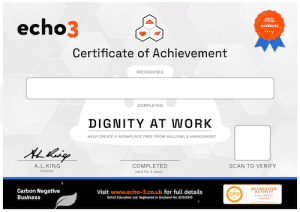
ECHO3 BENEFITS
 The Echo3 online Dignity at Work course offers numerous benefits.
The Echo3 online Dignity at Work course offers numerous benefits.
By addressing issues like bullying and harassment, the course equips individuals with practical tools to foster a positive work environment.
The interactive online format accommodates diverse schedules, allowing participants to learn at their own pace.
The course also promotes compliance with legal and ethical frameworks, reducing organisational risks.
Payment can be made securely online with Stripe or Paypal. Or email us for a quote and we can send an invoice.
The Echo3 training platform is carbon-negative so by choosing our training you’ll reduce you own businesses carbon footprint.
Administration is simple, we can find the best solution that works for you. Whether staff have email addresses of not.
WHAT IS HARASSMENT?
Harassment is defined in law as any unwanted conduct that “has the effect of violating an individual’s dignity or creating an intimidating, hostile, humiliating or offensive environment for that individual.”
Under the Equality Act 2010, harassment using this definition relates to nine specific characteristics protected by law.
The nine protected characteristics are:
- age
- disability
- gender reassignment
- marriage and civil partnership
- pregnancy and maternity
- race
- religion or belief
- sex
- sexual orientation
Discrimination by Association – The law also protects an individual where they themselves may not fall within the nine protected characteristics but they experience harassment or unfair treatment because they have, for example, family members or friends who do have a protected characteristic.
Harassment can usually be, but not limited to, put into three main categories. They are:
- Verbal
- Visual or Nonverbal
- Physical
WHAT IS BULLYING?
Bullying is described by ACAS (‘Advisory, Conciliation and Arbitration Service’) as unwanted behaviour that is “offensive, intimidating, malicious or insulting”.
Bullying may occur as a one-off incident or be something that happens regularly, and can be from one individual or a group. While often characterised as from a manager toward a member of their team, bullying can also arise from staff toward a manager or more senior employee. This is called ‘upward bullying’
Bullying behaviours can include:
- Criticism/personal insults
- Ignoring or excluding people
- Setting impossible targets
- Shouting at people
- Making inconsistent demands
- Intentionally blocking training / promotion opportunities
The definition of bullying does not include reasonable management action carried out in a fair way. Managers have a right to manage their team, set standards, and motivate staff to perform effectively. This should be done in a respectful way and should not be characterised by the abuse of power.
Clear and constructive feedback shared between a manager and an employee about their performance or conduct may sometimes feel uncomfortable, but this does not automatically mean that an individual is being bullied.
When concerns are raised it is therefore important to assess what is happening objectively.
RESPONDING TO A COMPLAINT
Response to any complaint should be guided by company policy and procedures (for example Grievance and Disciplinary Polices, Dignity at Work, Health & Safety, Equal Opportunities).
When there is a complaint of bullying raised, employers should always respond. It is important any complaint is investigated fairly, thoroughly, confidently, and promptly. This not only helps establish the facts rather than simply rely on subjective perception, but early action also increases the chances of securing a successful resolution.
If you do not act to resolve the complaint as quickly as possible, things may get worse. This may ultimately lead to legal action being taken against you.
CONTACT
 If you have any questions about this Dignity at Work training, please email info@lucyketcham.com.
If you have any questions about this Dignity at Work training, please email info@lucyketcham.com.
DIGNITY AT WORK
 Online Dignity at Work course designed for all staff. The training provides the knowledge needed to keep your workplace free from bullying and harassment.
Online Dignity at Work course designed for all staff. The training provides the knowledge needed to keep your workplace free from bullying and harassment.
Everyone at work has a right to be treated with dignity and respect. Upholding this right at all levels in your organisation is an employers duty under the Equality Act 2010.
Failing to promote a positive working environment can negatively impact moral, the quality of work and potentially result in legal action.
COURSE OBJECTIVES
 Everyone is entitled to a workplace free from bullying and harassment. This is a legal right of the Equalities Act 2010.
Everyone is entitled to a workplace free from bullying and harassment. This is a legal right of the Equalities Act 2010.
The Echo3 online dignity at work course provides the knowledge needed to help employees foster a respectful and inclusive workplace culture.
Participants develop an understanding of the importance of dignity, equality, and diversity, gaining insights into the legal frameworks and policies that underpin these principles.
Importantly this Dignity at Work course enhances awareness of inappropriate behaviours, such as bullying and harassment, and provides tools to recognise, prevent, and address these issues effectively.
Participants will also learn effective communication strategies to promote a positive work environment, emphasising empathy and active listening.
Ultimately, the course aims to empower individuals with the skills to contribute to a workplace where every member is treated with dignity and respect, fostering collaboration, employee well-being, and organisational success.
LEARNING OUTCOMES
 On successful completion of this Dignity at Work training, learners will be able to:
On successful completion of this Dignity at Work training, learners will be able to:
- Define the key aspects of dignity at work, including what is meant by harassment and bullying.
- Understand the relevant legislation behind dignity at work including individual responsibilities.
- Identify the potential impacts of adverse behaviour on workplace relationships.
- Understand the difference between effective staff management and inappropriate/bullying behaviours.
- Deal more effectively with complaints of harassment or bullying.
- Identify steps that support a positive and inclusive working environment.
COURSE CONTENT
 UNIT 1 | INTRODUCTION
UNIT 1 | INTRODUCTION
- What you will learn
- Learning objectives
UNIT 2 | BULLYING
- What is bullying?
- Bulling and the Law
- Examples of bullying
- How common is bullying?
- What bullying is not
- Effective communication
- Bullying resolution
UNIT 3 | HARASSMENT
- What is harassment?
- Harassment legislation
- Categories of harassment
- Sexual harassment
UNIT 4 | PREVENTION
- Bullying Vs Management
- Dignity at Work policy
- Roles
- Grievance procedure
- Trade Unions
UNIT 5 | RESPONDING TO A COMPLAINT
- Procedures
- Responding to a bullying or harassment complaint
- Formal investigation
- If a bullying complaint is upheld
- External bodies
UNIT 6 | QUIZ
WHO SHOULD TAKE THE COURSE?
 This Dignity at Work training has been designed for employees at all levels.
This Dignity at Work training has been designed for employees at all levels.
The course will benefit every organisation that aims to foster a respectful & inclusive culture, prevent bullying, harassment and discrimination, and comply with the Equalities Act 2010.
CERTIFCATE & ACCREDITATION
At the end of this CPD-accredited online Dignity at Work course there is a 15-question multiple-choice quiz.
Where learners demonstrate their understanding of course content by achieving a minimum score of 80%, they will then receive a completion certificate by email.
If a learner scores less than 80%, they can then revisit any part of the course and are offered the opportunity to retake the quiz until they are successful.
The Dignity at Work certificate is valid for 3 years.

ECHO3 BENEFITS
 The Echo3 online Dignity at Work course offers numerous benefits.
The Echo3 online Dignity at Work course offers numerous benefits.
By addressing issues like bullying and harassment, the course equips individuals with practical tools to foster a positive work environment.
The interactive online format accommodates diverse schedules, allowing participants to learn at their own pace.
The course also promotes compliance with legal and ethical frameworks, reducing organisational risks.
Payment can be made securely online with Stripe or Paypal. Or email us for a quote and we can send an invoice.
The Echo3 training platform is carbon-negative so by choosing our training you’ll reduce you own businesses carbon footprint.
Administration is simple, we can find the best solution that works for you. Whether staff have email addresses of not.
WHAT IS HARASSMENT?
Harassment is defined in law as any unwanted conduct that “has the effect of violating an individual’s dignity or creating an intimidating, hostile, humiliating or offensive environment for that individual.”
Under the Equality Act 2010, harassment using this definition relates to nine specific characteristics protected by law.
The nine protected characteristics are:
- age
- disability
- gender reassignment
- marriage and civil partnership
- pregnancy and maternity
- race
- religion or belief
- sex
- sexual orientation
Discrimination by Association – The law also protects an individual where they themselves may not fall within the nine protected characteristics but they experience harassment or unfair treatment because they have, for example, family members or friends who do have a protected characteristic.
Harassment can usually be, but not limited to, put into three main categories. They are:
- Verbal
- Visual or Nonverbal
- Physical
WHAT IS BULLYING?
Bullying is described by ACAS (‘Advisory, Conciliation and Arbitration Service’) as unwanted behaviour that is “offensive, intimidating, malicious or insulting”.
Bullying may occur as a one-off incident or be something that happens regularly, and can be from one individual or a group. While often characterised as from a manager toward a member of their team, bullying can also arise from staff toward a manager or more senior employee. This is called ‘upward bullying’
Bullying behaviours can include:
- Criticism/personal insults
- Ignoring or excluding people
- Setting impossible targets
- Shouting at people
- Making inconsistent demands
- Intentionally blocking training / promotion opportunities
The definition of bullying does not include reasonable management action carried out in a fair way. Managers have a right to manage their team, set standards, and motivate staff to perform effectively. This should be done in a respectful way and should not be characterised by the abuse of power.
Clear and constructive feedback shared between a manager and an employee about their performance or conduct may sometimes feel uncomfortable, but this does not automatically mean that an individual is being bullied.
When concerns are raised it is therefore important to assess what is happening objectively.
RESPONDING TO A COMPLAINT
Response to any complaint should be guided by company policy and procedures (for example Grievance and Disciplinary Polices, Dignity at Work, Health & Safety, Equal Opportunities).
When there is a complaint of bullying raised, employers should always respond. It is important any complaint is investigated fairly, thoroughly, confidently, and promptly. This not only helps establish the facts rather than simply rely on subjective perception, but early action also increases the chances of securing a successful resolution.
If you do not act to resolve the complaint as quickly as possible, things may get worse. This may ultimately lead to legal action being taken against you.
CONTACT
 If you have any questions about this Dignity at Work training, please email info@lucyketcham.com.
If you have any questions about this Dignity at Work training, please email info@lucyketcham.com.




